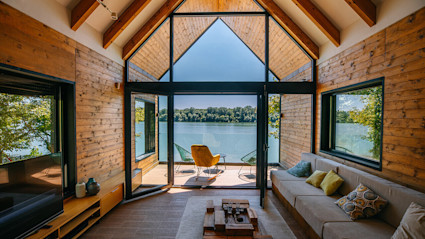Tips and advice
We give you everything you need to make the right holiday home decisions. Our blog offers the insights you need for buying, selling and owning a perfect retreat.

The Pacaso purchase path
Join us for a behind-the-scenes look at what it’s really like to buy a Pacaso. Whether you’re just starting to explore co-ownership or already considering a home, this session is designed to give you clarity and confidence in the process.
You’ll hear directly from our expert team — Ramon, Phoebe, and Lana — as they walk through every step of the seamless Pacaso ownership journey. From offer acceptance to move-in day, you'll learn how Pacaso handles all the details, including legal paperwork and personalized support, so you can focus on the joy of owning a second home.
We’ll also cover what happens after closing, including our white-glove services and long-term management, plus answer frequently asked questions.
Read
12 Luxury real estate market trends for 2025
Say you've been planning the ultimate luxury vacation for a couple of years. You've got your list of dream destinations, top-notch resorts, and must-try experiences all lined up. But just as you're about to book, you discover some places have become overcrowded, while hidden gems have emerged elsewhere. Suddenly, your itinerary needs a revamp. The luxury real estate market isn't much different. Economic shifts, evolving consumer tastes, and technological innovations continually reshape the landscape. In this guide, we’ll walk you through the top luxury real estate trends of 2025 so you can create a strategy that leads to 1. Smaller homes are becoming more luxurious Smaller homes continue to gain popularity among luxury buyers in 2025, and it's not just about saving money — it's a lifestyle choice. Recent data from the Affluent buyers are prioritizing convenience and financial flexibility, seeking homes that require less maintenance without sacrificing those high-end finishes we all love. Many buyers are choosing smaller homes because they're easier to purchase with cash, avoiding mortgage debt and those pesky rising interest rates. Why smaller luxury homes work: 2. The luxury market is stabilizing as inventory rises and price growth cools After years of soaring prices and fierce competition, the luxury housing market is shifting toward a more balanced state in 2025. The extreme ups and downs we've seen in previous years are leveling off as more high-end properties become available. This increase in supply is giving buyers more options and cooling down the frenzy that once drove those intense bidding wars. In some areas, luxury home prices are even seeing slight declines — a welcome change for buyers. While demand for luxury properties isn't disappearing, the days of skyrocketing prices and bare-bones inventory seem to be behind us, pointing to more stable luxury real estate trends in the coming years. 3. The luxury real estate market is becoming more globalized Market trends in “Texas is seeing steady growth, especially in cities that offer business opportunities without the tax burdens of other states. At the same time, international luxury markets are evolving. A study by 4. Luxury price growth is slowing while select markets experience corrections Luxury home prices in the U.S. continue to rise, but the pace of growth is slowing. According to Redfin, the Some markets are still seeing impressive gains, such as: However, signs of correction are emerging in select cities, like: This suggests a potential shift in the New listings in the luxury market have surged in several key areas, giving buyers more choices and taking the pressure off prices. Providence, RI (31.5%), Miami (28.1%) and Tampa, FL (27.6%) saw the biggest jumps in new luxury home listings. Meanwhile, the pace of sales varies dramatically — on average, luxury homes in Seattle sold in just six days, while Miami's high-end properties lingered for 114 days. These luxury real estate market trends highlight how the high-end housing sector is evolving, with some cities still seeing rapid growth while others are cooling down or making slight adjustments. 5. Cash is king, but financing is gaining traction in the luxury market While cash has traditionally dominated luxury real estate transactions, financing is making a comeback as interest rates begin to descend. Though interest rates remain higher than pre-pandemic levels, their gradual decline opens financing options for luxury buyers. Many wealthy individuals still prefer cash purchases to avoid borrowing costs, but others are dipping their toes back into the mortgage market as rates become more attractive. Beyond traditional mortgages, savvy buyers are getting creative with margin loans, stock portfolio loans and private banking credit lines to fund their purchases. Cash remains a powerful advantage in competitive markets where bidding wars still happen. However, as borrowing costs continue to fall, experts predict more luxury buyers will incorporate financing into their strategies. This shift reflects a broader normalization in the 6. Luxury buyers are adapting to evolving interest rates With This hesitation creates a more balanced market, forcing sellers to adjust their expectations. As overpriced homes sit longer, buyers are holding out for better deals, potentially leading to win-win negotiations for both parties. Despite the challenging economic environment, cash-rich buyers remain active in the Dahlia Fox, a real estate agent with The luxury real estate market in 2025 is likely to see more price adjustments as everyone adapts to the new financial reality. 7. Luxury second-home market and co-ownership is booming Even with economic challenges, the demand for luxury
Real estate expert and Platforms like Pacaso, where families can purchase fractional ownership of a luxury home with maintenance handled, are gaining popularity. This trend in the luxury home market makes owning that 8. Investors are expanding their portfolios with high-end real estate Despite economic shifts, luxury real estate remains a stable and attractive asset. Investors are particularly eyeing Thomas Franklin, Founder and CEO at This shift toward managed asset pools lets investors spread their capital across multiple luxury properties, enjoying both flexibility and access to global markets while minimizing risk — a trend that's reshaping luxury real estate market trends in 2025. 9. Smart homes are becoming essential rather than a luxury feature According to Rachel Stringer, "Technology is built into every part of high-end real estate now. Homes that aren't equipped with automation, security and seamless integration of smart features feel outdated before they even hit the market." With AI, IoT and big data working together, these smart systems are completely transforming how luxury homes operate, delivering next-level comfort and efficiency that today's discerning buyers demand. These luxury home trends are rapidly becoming the new standard rather than exceptional features. 10. Luxury buyers are prioritizing sustainability Sustainability is becoming a top priority for luxury buyers in 2025, with a growing emphasis on energy efficiency, eco-friendly materials and green spaces. As climate awareness rises and government regulations tighten, we're seeing a notable shift toward sustainable Rachel Stringer puts it perfectly: "The conversation about sustainability has also shifted. It's not about marketing a home as eco-friendly for show — it's about efficiency. Solar panels, energy storage, water recycling and passive design are becoming standard because they lower long-term costs and increase self-sufficiency." Investing in green properties with 11. Luxury home buyers are prioritizing resiliency features Luxury home buyers are increasingly looking for properties that can weather natural disasters — literally. In regions prone to hurricanes, wildfires and flooding — like California, New Orleans and Florida — buyers want more than just beautiful homes. They want properties with features that ensure their investments remain safe and functional no matter what Mother Nature throws their way. These features include: Nathan Mathews, CEO of 12. Gen-X and Millennials will influence the market Millennials and Gen-Xers are reshaping the luxury real estate market. Affluent millennials gravitate toward homes featuring cutting-edge technology, sustainability and energy efficiency, viewing real estate as a lifestyle statement and a financial investment. Their preference for urban properties or resort homes with income potential drives demand for smart, sustainable luxury properties across the market. Gen X buyers, now in their prime earning years, are focusing on long-term asset diversification. With wealth inherited from baby boomers, they're seeking homes with premium amenities, enduring value and stability for future generations. As Rachel Stringer notes, "Millennials and Gen X prioritize functionality, privacy and convenience. They want spaces designed for how they actually live — integrated wellness features, easy-to-maintain outdoor areas and turnkey properties." These generations are significantly influencing luxury real estate trends with their distinct preferences and priorities. Luxury real estate made easy with Pacaso The luxury real estate market is always evolving, and 2025 promises to bring new opportunities and challenges for prospective buyers. Whether you're looking for a primary residence or a To stay ahead of the latest luxury real estate market trends and discover exclusive high-end listings, Pacaso can help you cross the finish line on your vacation home ownership journey (or even help you figure out how to
Read
Pacaso vs. timeshare: What sets us apart
At first glance, co-ownership of a Pacaso might not seem that different from a timeshare. After all, you don’t own the whole home yourself, so you can’t just show up on a whim anytime you feel like popping over. But, that’s where the similarities end. Start searching for information on timeshares, and you’ll find a lot of horror stories. Read And that’s because Pacaso is not a timeshare, it’s true property ownership (but without all the hassles). Here are five reasons buying a holiday home with Pacaso will fill you with joy, not regrets. Each Pacaso is a one-of-a-kind holiday home Not just any property can be a Pacaso. We seek out the best properties in the best locations — each one is different, and all of them have that special “wow” factor. Then our professional interior designers get to work, selecting the perfect furnishings, modern amenities and special touches to ensure your home is a place you’ll feel comfortable and relaxed whenever you walk through the door. A Pacaso is a luxurious home away from home. A timeshare is almost always a unit at a hotel or apartment complex. Think cookie-cutter floor plans and typical hotel-style furniture. You might have neighbours on both sides, above and below — hopefully the soundproofing is up to scratch. A small group of co-owners enjoy the property Because Pacaso limits the number of shares per home to eight, you and just seven other owners, at most, will have access to the property (only one owner will occupy the property at a time, of course). Plus, Pacaso properties are reserved for the exclusive use of owners and their guests — rentals aren’t permitted. Pacaso vets potential owners, who agree to a common sense Code of Conduct to ensure they will treat the home as their own — because it is! Plus, you won’t feel like you’re “sharing” your Pacaso. We conduct a thorough inspection and cleaning after each stay, so your holiday home is pristine when you arrive. A timeshare unit may be shared by 52 other people — one person or group for every week of the year. Additionally, some timeshares allow for swaps or rentals, increasing the number of potential guests. You own property, not time One of the biggest differences between Pacaso and a timeshare is what you actually When you purchase a timeshare, you typically own the right to You can use your home year-round Each Pacaso share gives an owner ongoing access to their home, and most owners stay 6-7 times per year. You aren't locked into a specific week or weeks each year, and you don’t even have to schedule weeklong stays. You can enjoy a weekend getaway or a mid-week escape, and you have the flexibility to plan stays anywhere from 8 days to 24 months in advance. Short-notice stays can be booked just two days in advance! You’re also guaranteed one “special date” per year, which includes school holidays, Christmas and other bank holidays. You may not get your first choice every year, but since you can book dates up to two years in advance, you’ll always have another opportunity to bag your favourite. You book time at your home using the Pacaso app, powered by our SmartStay scheduling system. It’s easy to use and equitable for owners, based on the number of shares you own. When you buy time at a timeshare, you’re often locked into a fixed week, year after year. You may have a “floating week” option, but your choices are still restricted to a range of dates. With either option, you can only check in on certain days, and you typically must book a full week. There are exchanges and point-based systems which allow you to choose different resorts, but you’ll often pay extra for more desirable locations, and availability can be limited. If you have a fixed-week schedule, you may never get a particular holiday week if it was already locked in by another owner. The resale process is streamlined We think you’ll love your second home for years to come — but when it’s time to sell, we want that process to be as smooth and simple as the purchase process. You set the price you want, and we’ll market and list the home much like a traditional property listing. Because our properties are thoughtfully selected and located in some of the most desirable holiday home markets, we’ve experienced strong buyer demand for Pacaso shares. On average, Pacaso shares resell in fewer than 10 days, with a 10% gain, on an annual basis ( For timeshare owners, resale is one of the biggest sources of stress. There’s a supply and demand imbalance, with a glut of sellers trying to get rid of their units (and the accompanying resort fees) to a smaller pool of buyers. There is a resale market, to be sure, but most people end up selling at a huge loss — you’ll find sellers on Ebay asking Experience the joy, not the regrets Pacaso offers exceptional holiday homes in top locations. Our pricing and costs are transparent and equitable, and you’ll never be surprised by hidden fees or bound to a rigid schedule. Instead, you get to enjoy your own private, luxurious oasis throughout the year, while Pacaso takes care of maintenance and property management.
ReadSustainable Luxury Homes: Eco-Friendly Living
The Rise of Sustainable Luxury in Real Estate In the world of luxury real estate, a new trend is emerging that marries opulence with environmental responsibility. High-net-worth individuals are increasingly seeking second homes that not only offer lavish amenities but also embrace sustainable practices. From the rolling Eco-Friendly Innovations in Sonoma Sonoma County is a beacon of sustainable luxury, where eco-conscious homes blend seamlessly with the natural beauty of Discover the sustainable charm of Sustainable Living in Santa Barbara & Montecito In Santa Barbara and Montecito, luxury homes are designed to harmonize with the coastal environment. These properties often feature solar panels, smart home technology, and native landscaping. The integration of sustainable materials and energy-efficient systems not only reduces environmental impact but also enhances the home's aesthetic appeal. Eco-Conscious Design in Jackson Hole Jackson Hole is a leader in eco-friendly architecture, where homes are crafted to blend with the breathtaking natural surroundings. Sustainable features such as geothermal heating, reclaimed wood, and rainwater harvesting are common. These innovations not only promote environmental stewardship but also offer long-term cost savings. Experience the serene beauty of Urban Sustainability in London London's luxury real estate market is embracing sustainability with features like solar panels, Explore the elegance of the Eco-Luxury in Bend, Oregon Bend, Oregon, is a haven for eco-luxury living, where homes are designed to minimize environmental impact while maximizing comfort. Features like high-performance insulation, solar panels, and water-saving fixtures are standard in these properties, reflecting a commitment to sustainability. Immerse yourself in the natural beauty of The Role of Co-Ownership in Sustainable Living Co-ownership models, like those offered by Pacaso, are making sustainable luxury more accessible. By sharing ownership, multiple parties can enjoy the benefits of a high-end, eco-friendly home while reducing the overall environmental footprint. This innovative approach aligns with the growing demand for sustainable living solutions. Conclusion: Embrace Sustainable Luxury Sustainable luxury homes are not just a trend; they represent a fundamental shift in how premium real estate is defined. By integrating eco-friendly features and innovative co-ownership models, these properties offer a unique blend of opulence and environmental responsibility. Explore the possibilities with Pacaso and discover how you can own a piece of sustainable luxury in top destinations like
Read
10 second home down payment options for 2025
The good news is that if you 1. Savings and investment account Using your personal bank account to fund your second home down payment is about as straightforward as it gets. The money is easily accessible and will only earn minimal interest if left in the account. Putting these funds to work may be smarter rather than taking out a larger loan for a second home. But that’s not the only personal fund you can tap into for Using money from your investment account is similar to withdrawing from your savings account. The key difference is that you may need to pay taxes on any gains the money earned while invested. 2. Sale of an asset Selling assets when you come up short on funds may be the only way to keep that second home of your dreams from slipping through your fingers. Understanding If you see your property as a better investment than your savings, it may be worth it to 3. Retirement account Tapping into retirement accounts, such as a 401(k) or IRA, can be a source of funds for your down payment for a second home. However, this age-sensitive strategy may not be advisable for those nearing retirement. If you’re not comfortable dipping into your savings or selling assets, you can still seek outside funding help. 4. Home equity loan or HELOC The value you've built in your current home can be a powerful resource when purchasing a second property. Leveraging your home equity gives you access to funds at generally favorable rates compared to many other financing options. A practical approach to securing funds for a second home down payment is utilizing the equity you've accumulated in your primary residence. This strategy involves either securing a Home equity loan With a home equity loan, you receive a one-time payment based on a portion of your home's value through a secondary mortgage. The key benefit is maintaining your original mortgage intact — particularly advantageous if you have a favorable interest rate. Since these loans are second in line for repayment if financial difficulties arise, they typically carry higher interest rates than current mortgage rates for second home loans. Home Equity Line of Credit (HELOC) A HELOC functions as a secondary mortgage but operates more flexibly, similar to a revolving credit account. During the initial access period (generally five to 10 years), you can withdraw and replace funds repeatedly. You'll only pay interest on the amount currently borrowed. After this period ends, the withdrawal option closes, and you begin repaying both principal and interest on whatever balance remains. Since HELOCs feature adjustable rates, your payments may fluctuate monthly based on market conditions. Cash-Out Refinance When choosing a 5. Government-backed loans While traditional government-backed loans are designed for primary residences, there are strategic ways to use these programs that can help you Government-backed loans such as VA or USDA offer low or no down payment options, typically for primary residences rather than second homes. However, by carefully planning your home purchases, you can transition from one primary residence to another while retaining your previous home as a second property. 6. Reverse mortgage A reverse mortgage allows homeowners aged 62 and older to convert part of their home equity into cash without having to sell their home or pay additional monthly bills. The loan is repaid when the borrower moves out, sells the home or passes away, making it a potential source for second home down payment for retirees.
7. Gift of equity funds When purchasing a second home from a family member, a gift of equity can be mutually beneficial. This approach involves the seller (often a parent or relative) transferring a portion of their equity in the property to you as a gift, effectively reducing the purchase price and minimum down payment for a second home.
8. Assumable mortgages An assumable mortgage allows you to take over the seller's existing loan instead of obtaining a new one. This can be particularly advantageous in a rising interest rate environment, as you may be able to secure a lower rate than what's currently available. This is an excellent option for those researching how to buy a second home with low down payment.
9. Seller financing Seller financing creates a direct financial arrangement between you and the property seller, bypassing traditional mortgage lenders. The seller essentially becomes your lender, allowing you to pay them directly according to mutually agreed terms. This option can be helpful when considering a loan for a second home with non-traditional terms. 10. Lease with an option to buy This arrangement allows you to rent a property while securing the right to purchase it in the future. During the lease period, a portion of your monthly rent may be credited toward the eventual down payment on a second home, helping you build equity while you live there. While sticking to one funding source may not be enough for your down payment — or put you into financial jeopardy — using a mix-and-match approach may improve your situation. Mitigating risk is still important even though real estate is considered a relatively safe investment. Look into each of these strategies further to learn which is best for you when Are second home down payments always required? In most cases, a down payment on a second home is required. If you plan to pursue a conventional loan for financing a second home, you’ll need to put money down upfront since they aren’t backed by the government. Even if you plan to pay for the home entirely in cash, you’re still technically putting down a large payment. If you plan to turn your second home into a primary residence, then it’s possible to get a government-backed loan. In that case, you won’t need a down payment for a second home. How much do I need for a down payment on a second home? The down payment for a first home can be as low as 0% and as high as 20% for a conventional loan. However, the required down payment for a second home is around The amount you’ll need for a down payment on a second home depends on several factors, including your credit score, your debt-to-income (DTI) ratio and the cost and type of property you’re purchasing. Down payments and interest rates for second homes can also vary depending on the lender, so it’s a good idea to shop around. Here is a closer look at how these factors can affect your down payment: Any tips on how I can reduce the down payment on my second home? One of the best ways to lower the out-of-pocket expense for a second home down payment is by reducing how much you’re paying for the home. But that doesn’t necessarily mean sacrificing square footage, quality or location. Explore your options for second home ownership Finding the right financing strategy can help you achieve your dream of owning a second home, whether through a government-backed loan, a conventional mortgage, or co-ownership. If you’re looking for a modern, hassle-free way to own a second home, Pacaso makes it possible. Pacaso offers LLC co-ownership of luxury second homes, providing a streamlined and cost-effective alternative to traditional second homeownership. With professionally managed properties and a fully integrated ownership model, you can enjoy all the benefits of a second home without the hassle of maintenance. Want to learn more? Visit our
Read
Dog-friendly vacations: 34 tail-wagging travels for 2025
Coordinating Your pet deserves luxury on vacation, and so do you. Selecting the right destination can provide you and your pet with the carefree escape you’re hoping for — and maybe even introduce you to a location for a second home that's great for you and your pup. Browse these top pet-friendly vacation spots — listed in no particular order — to get ideas for your next trip. Ready, set, go fetch your next dog-friendly vacation destination! 1. Block Island, Rhode Island When it comes to dog-friendly vacations, Block Island is one destination you won’t want to miss. From scenic walks to water taxis, there's so much for you and your pup to enjoy together. Brenton Point State Park offers beautiful views of the bay, with kite fliers taking advantage of the gusty ocean winds. Have a picnic at Grab a bite to eat at 2 The City of Brotherly Love extends its hospitality to four-legged friends. Visit For a break from the concrete jungle, head to the 3 This Northeast pet friendly vacation spot has beaches, brewskies and bogs to entertain you and your dog. Surfside, Brant Point and Cisco Beaches all provide sandy ocean fun. Take a ride on the When it’s time to rehydrate and replenish your calories, head to Easy Street Cantina or the Sandbar at Jetties Beach for fresh food and refreshing drinks. In terms of dog vacations, this one is hard to top. 4. Jim Thorpe, Pennsylvania What may at first seem like a sleepy town in the Poconos is a must-see place to go with your dog. Fido is welcome on the vintage
5. Long Island, New York The largest island in the country offers pet-friendly beaches, hiking trails and more. Take your dog walks up a notch by strolling around
Long Island has plenty of dog-friendly breweries, and there’s even a tour that takes you to all of the best neighborhood taprooms. 6. Lake Placid, New York There’s so much to experience in Lake Placid. Enjoy a convenient stay at the pet-friendly Town House Lodge, just a stone's throw away from the lake and a short walk from Main Street. Rent a boat from
The 7. Stowe, Vermont Stowe has no shortage of pet-friendly vacation ideas. The 8. Bar Harbor, Maine If you and your furry friend share a love for the ocean, the seaside town of Bar Harbor has everything you need. This quiet town of 5,000 provides nature cruises for leashed pets, so you both can try spotting a variety of sea creatures, like porpoises and seals.
Take a picturesque walk around dog-friendly 9. Chicago, Illinois Bring your pet to this lakeside city for fun on and off the water. Multiple Montrose Dog Beach allows your pet to dip their paws in the lake and even provides free waste bags and a dog wash area. The pet-friendly 10. Madison, Wisconsin Sitting on an isthmus between two lakes, Madison has a whole lot of green space perfect for traveling dogs, including
For two-legged visitors,
The BarleyPop Tap and Shop provides another dog-friendly taproom with an extensive craft beer selection. If spirits are more your thing, the 11. Milwaukee, Wisconsin Stroll Milwaukee’s winding
Treat your good dog to a spa day at 12. Grand Haven, Michigan This cozy western Michigan town offers plenty of fun for you and your pup while avoiding the overwhelming crowds of some better-known dog-friendly getaways. Take your time as you stroll down the Rent your own pontoon for a relaxing cruise or a water skiing excursion. Then step back into a time capsule at 13. Cleveland, Ohio This Lake Erie city blends freshwater fun with urban attractions. The downtown dog park offers 3,500 square feet of off-leash play space. The Then head to the 14. Indianapolis, Indiana This dog-friendly getaway blends city entertainment with natural attractions. The Enjoy the Downtown Canal Walk’s three-mile loop, or rent a pedal boat for a unique view of the city. Treat your pup to a movie at the 15. St. Augustine, Florida St. Augustine, the oldest continuously inhabited city in the U.S., is brimming with history for you and your pet to experience together. Ponce de Leon’s Fountain of Youth Archaeological Park includes a planetarium, Timucua Native American village and an observation deck. Wild peacocks roam the park, so be sure to keep your dog leashed. In town, you can take your dog on a wine-tasting tour in a horse-drawn carriage or ride on 16. Key West, Florida
Your leashed dog can stay by your side as you tour the local aquarium and witness shark feeding and alligator exhibits. You won’t want to miss your chance to dine on fresh seafood like fish tacos at 17. Asheville, North Carolina If the Southeast is more your style, grab the leash and head to Asheville, North Carolina. Take a stroll through Asheville has trolley tours for dogs up to 25 pounds, or you can scratch nature’s itch with a walk through 18. Charleston, South Carolina Fans of the macabre won’t want to miss the city’s 19. Hilton Head, South Carolina You can stick to living on island time at pet-friendly The 20. Shenandoah Valley, Virginia Virginia may be for lovers, but it’s also great for your fur baby. Shenandoah Valley has dog-friendly wineries, nature trails and other activities. The 21. Birmingham, Alabama Get a taste of Southern comfort food at Crazy Cajuns’ Boiling Pot, the punk rock-friendly Black Market Bar and Grill or Back Forty Beer Company. 22. Austin, Texas Austin is one of the best pet-friendly vacations in the United States! Prepare for sensory overload at the When you need a little extra energy to make it through the day, or maybe just to burn some of your pet’s energy, head to the 23. Sedona, Arizona 24. Albuquerque, New Mexico This Southwest city is well-known for its delicious food and lively festivals, but its reputation as a pet-friendly destination is also noteworthy. Your leashed dog can join you on an outdoor adventure along the La Luz Trail, much of If you need to give your paws a break, hitch a ride on the open-air 25. San Francisco, California San Francisco makes our list of best pet-friendly vacation spots thanks to its gorgeous scenery and dog-friendly accessibility. Your dog can splash in salt water at Golden Gate Park’s off-leash section is a viable alternative for dogs wanting to keep sand out of their fur. For an added activity, try the modern treasure hunt known as geocaching, which is great for dogs and children alike.
26. South Lake Tahoe, California Bring your dog with you as you try your hand at sport fishing, kayaking or paddleboarding. Lake Tahoe’s dog-friendly beaches also provide the option for a restful day soaking up the sun. Stop at the 27. Huntington Beach, California Huntington Beach — aka Surf City, with its 10 miles of coastline — is an evergreen pet-friendly vacation destination, thanks to its sunny After a day of frolicking on the beach, try some fresh seafood at 28. San Diego, California Make your dog’s ocean dreams a reality by taking a pet-friendly vacation to
For a more sure-footed activity, spend the afternoon at the 29. Napa, California Stock up on necessities or treats for you and your dog at the 30. Colorado Springs, Colorado Get away from big-city vibes and get back into nature in Colorado Springs. The impressively named For the less adventurous, Colorado Springs has plenty of places to go with a dog. 31. Kanab, Utah You have to see Kanab to believe it. Known colloquially as “Little Hollywood,” dozens of movies and television series are filmed in and around the area’s national parks due to the striking scenery. Your dog can join you as you walk remote trails, or you can both jump in a 4x4 for a guided desert safari.
Be sure to stop by the 32. Boise, Idaho If you and your hound are tired of being confined indoors, Boise is a perfect pet-friendly escape. Tree-lined paths link the Winstead Park offers designated off-leash hours throughout its 11 acres of green space. The Spacebar Arcade lets you drink and game with your dog by your side. And your pup is welcome at the 33. Seattle, Washington Beat the heat with a pet-friendly vacation to the Pacific Northwest. Visit the city’s largest downtown green space at Along the shores of Lake Washington, you’ll find the 230-acre 34. Bend, Oregon The city of
The Riverbend Beach Dog Park is a fenced oasis for your furry friend to socialize in and out of the water. Drink in Bend’s craft beer scene by walking the Taking a vacation with man's best friend requires some extra planning, but with some careful preparation — it'll give both you and your pup something to wag about. Before you hit the road, make sure your pet is primed for the journey. Pack essentials like food, water, bowls, a leash, and any necessary medications to set your pack up for success. Ensure your pet's identification and vaccinations are current, and consider a microchip for extra safety. If traveling by car, secure your pet with a harness or carrier, and plan for frequent breaks for potty stops and exercise. After all, a tired pup is a happy pup! When selecting a dog-gone great destination, consider the climate and specific activities you and your pet will enjoy. Research pet-friendly parks, Sites like BringFido, Petswelcome, and GoPetFriendly specialize in pet-friendly accommodations. They have filters to narrow your search based on pet size, breed, and any extra fees. For example, on BringFido, you can filter for hotels with no size restrictions, which is perfect if you have, say, a Great Dane. Sites like Now that you've planned your destination and travel, it's time to nail down an itinerary that will Here are some of the best types of activities to share with your dog on vacation: The great outdoors is almost always a safe bet for dog-friendly vacations. Hike scenic Who says pups can't be cultured? Many experiences, such as museums, zoos or historical tours, are pet-friendly. For instance, in Charleston, South Carolina, you can take a pet-friendly After a day of exploring, treat yourself and your furry friend to some delicious eats, a local beverage, or some Remember to always confirm pet policies beforehand to ensure an enjoyable experience for you and your pet. Tips for a pet-friendly vacation The key to a successful pet friendly vacation is preparation. Keep these tips in mind before hitting the road or taking to the air. 1. Consider the mode of transportation How you’ll get to your destination depends on how far away from home you’re going, of course, but you’ll also want to consider your dog’s comfort. Some dogs are perfectly fine flying on an airplane, but it can be traumatic for others. Some dogs love a road trip, while others don’t like being stuck in a car for a long time. Consider your dog’s personality before plotting your course. 2. Test your pet’s travel tolerance Before you go on a vacation with pets, see how they respond to being cooped up or in a car for long periods. You may discover they get motion sickness or need more frequent breaks than you were prepared for. 3. Double-check dog-friendly accommodations Before you leave, it’s smart to verify that you can bring your furry friend along to your hotel or vacation rental. Businesses can change their policies at any time and you don’t want to be left without a place to stay. The best dog-friendly hotels go out of their way to welcome four-legged guests, with special amenities like treats and dog beds. Regardless of where you stay, it’s important to note even when dogs are allowed, many hotels won’t allow you to leave your pet unattended in a hotel room while you’re out and about. 4. Make a dog-friendly vacation itinerary Think through the places you want to visit on your vacation. For example, dogs are allowed in most national parks, but you’ll need to keep them on a leash and on the trail at all times. In town, look for pet-friendly restaurants with outdoor dining options. 5. Pad your travel schedule Even a well-trained dog can act out of character in new or unfamiliar environments. Allow for extra time for your four-legged friend to get acclimated so you don’t miss out on sought-after activities or reservations. 6. Update your pet’s identification and vaccinations Make sure their collar or chip has your current contact information. This way if you get separated while on vacation, they can be identified and reunited with you. On top of that, doublecheck that all of your pet’s vaccinations are up to date. Many businesses, including 7. Bring extra supplies Pack more waste bags, medications and other necessities than you think you’ll need, just in case. Don’t forget to pack food, a water bowl and a few items to help your pet feel comfortable, like a portable dog bed and a few of their favorite toys and treats. Buy your own dog-friendly vacation home Like most humans, most pets enjoy a sense of familiarity and routine. Instead of staying in a new hotel in a new city every time you travel, consider setting down roots in your (and Fido’s!) favorite dog-friendly vacation destination. The best dog vacation is one your pup will enjoy every time. As a second home owner, you can enjoy all the comforts of home while venturing out together in search of local dog-friendly parks, dog-friendly hiking trails and maybe even a dog-friendly beach. It should come as no surprise that man’s best friend can also make a great companion on your travels, but pet-friendly vacations require a special type of planning to make them enjoyable. Use the destinations on Imagine having a second home in one of these pet-friendly destinations. Browse
Read
How Much Does A Mansion Cost and What Are My Options?
If you've ever found yourself pondering mansion prices — whether fueled by aspirations of grandeur as a homeowner, a fascination with amazing The cost of a mansion can vary greatly depending on several factors, including:
Mansions are typically high-end, extravagant properties, and their prices can range from What is a mansion? A Mansions may also boast additional amenities like resort-style swimming pools, home theaters, extensive landscaping, private gyms, wine cellars, bowling alleys, private golf courses, spas, and guest houses. How much do mansions cost to build? The While providing an exact figure without specific details is challenging, the cost of building a mansion can range from several million to hundreds of millions of dollars. The cost per square foot of constructing a mansion is generally higher than that of a standard home due to the higher-quality materials, intricate designs and ornate features. It's important to note that you must consider additional expenses when estimating the overall cost of building a mansion, including: Needless to say, it’ll most likely be your most expensive option regarding home types. To obtain a more accurate estimate for building a mansion, it’s best to consult with experienced architects, contractors and construction professionals who can assess your needs and provide a detailed cost analysis based on your desired specifications and location. Below are the pros and cons of getting a mansion built: How much does it cost to buy a mansion? According to the Federal Reserve Bank of St. Louis, the However, the cost of a mansion can vary depending on other factors, which is why you’ll find mansions spanning from $1 million to well over $300 million. For example, in extremely wealthy areas such as Beverly Hills, mansions can often be priced in the tens of millions or even hundreds of millions of dollars. On the other hand, in less expensive areas with a lower cost of living, the price range for mansions may be much lower. While it’s possible to find homes larger than 8,000 square feet priced under $1 million, they may be run-down or lack the stately finishes and amenities commonly found in mansions. In this case, a renovation might be worth considering, which is also a factor to consider when buying vs. It's also important to take into account the additional expenses associated with owning a mansion, including: These costs can be considerably higher than those of a standard home due to the larger property size. Below are the pros and cons of purchasing a mansion: How much it costs to rent a mansion Renting a home generally costs approximately While rental properties often take care of maintenance and utilities for you, some don’t, adding an extra expense to consider when renting. While securing a long-term lease for a mansion may not be a practical option for many people, it can certainly be a fun choice for a short-term stay, such as a weekend getaway or a How much does a mansion cost through co-ownership? While purchasing a mansion as your Considering you will only be utilizing the property during specific periods throughout the year, co-ownership is pretty convenient. You might even consider inviting friends or family members to share ownership with you. To ensure mutual understanding, it’s a good idea to engage a lawyer who can assist in drafting a formal agreement that delineates the terms and conditions of the shared ownership arrangement. Below are the pros and cons of owning a mansion as a second home. A mansion is undoubtedly a major investment if you’re looking to Although living in a mansion may be a dream for those with a taste for luxury, it’s not always a realistic option. Fortunately, your aspirations of owning a mansion can become a reality when you Check out
Read
How Pacaso resale works
When you decide to sell a whole home, you might take a look at recent home sales in your area, check your home value on various real estate sites, decide on a price, list the home and wait for offers to roll in. When you own a Pacaso, the sales process includes some of those steps, but you’ll find it simpler and more streamlined. Here’s how it works. 1. Sell on your terms Any Pacaso owner can choose to sell their ownership interest, at any time.* Each owner has independent control over the sale of their share, which is a key benefit of our professionally managed LLC co-ownership model and a big advantage over timeshares. Once you’ve decided to sell, simply let us know, and we’ll provide you with a current comparative market analysis (CMA) for your ownership interest. The CMA is compiled using local market data, comps, trusted valuation models, and our knowledge of what active second home buyers are willing to pay. You’re in control of the final price, however. You can use the CMA in addition to guidance from Pacaso or your own research to decide what the sale price should be. 2. Take advantage of an existing marketplace Unlike a typical home sale, Pacaso has two ways to assist you in the sale process Second, many homes have a wait list of interested buyers. Our sales Crew will tap into our buyer pipeline when a share is up for resale and inform any buyers who may have missed out on the opportunity initially, as well as buyers who’ve indicated interest in similar homes in that area. Between current owners and Pacaso’s buyer marketplace, you may be able to sell your share without listing it. 3. Get the full marketing treatment As the market leader in vacation home co-ownership, Pacaso puts the resources of our entire team behind owners looking to resell their Pacaso home. First, we market to existing Pacaso owners and our marketplace of buyers (some homes even have waitlists). Next, we prepare your share for broad exposure on the open market to ensure you have every opportunity for a sale. If we don’t have an offer right away, we’ll include the home as an active listing on our website and work with our local partner agents to hold open houses and market the listing through their networks. We then market your listing through a mix of traditional and digital media advertising, leveraging our proprietary technologies along with custom, data-driven strategies tailored to your unique offering. 4. Experience a seamless and transparent transaction Pacaso’s role in the sale is to help facilitate the transaction and find buyers. There’s no lengthy closing process, no due diligence period, and no need for a title and escrow company, because the title doesn’t change. The LLC membership interest is simply reassigned to the new owner at closing. If the buyer is paying cash, closing can be as soon as the next day. If the buyer is financing their purchase, closing is still much faster than a typical sale, often just 1-2 weeks. Pacaso resale performance According to From 2021 to 2024, Pacaso homes have outperformed market averages in several luxury markets. In Napa-Sonoma, CA, Pacaso shares appreciated by 12.4%, compared to the market's 0.4%. Lake Tahoe, CA, experienced a 9.5% appreciation in Pacaso shares, versus the market's 3.2%. In Vail, CO, Pacaso shares grew by 6.7%, compared to the market's 1.2%. Finally, in Charleston, SC, Pacaso shares appreciated by 7.9%, while the market saw a 2.9% increase. Overall, Pacaso shares have consistently outperformed the broader luxury market. Looking across all resales, Other avenues for Pacaso owners Owner selldown If you decide your Pacaso isn’t a good fit, or if you purchased more ownership than you’re using, you have options beyond a traditional resale. Own 1/4 or 1/2 of a Pacaso, but only use it 1/8 of the time? You can right-size your ownership by selling a portion of your ownership interest. A selldown works the same way as a resale transaction, but you retain a share of the home. Pacaso gives sellers an exceptional level of flexibility, control and peace of mind. Hear from Pacaso owners about the ease of their resale experience. Frequently asked questions Can the seller really choose any sale price? Pacaso recommends a price, but the seller makes the final call. If the price seems too high, we’ll share the information we have about the buyers in our pipeline, including what we know about their price ranges. But the seller can choose to proceed with the price they’ve set and see what the market will bear. What happens if a share isn’t selling? As the market leader in vacation home co-ownership, Pacaso puts the resources of our entire team behind owners looking to resell their Pacaso home. First, we market to existing Pacaso owners and our marketplace of buyers (some homes even have waitlists). Next, we prepare your share for broad exposure on the open market to ensure you have every opportunity for a sale. If we don’t have an offer right away, we’ll include the home as an active listing on our website, and work with our local partner agents to hold open houses and market the listing through their networks. We then market your listing through a mix of traditional and digital media advertising, leveraging our proprietary technologies along with custom, data-driven strategies tailored to your unique offering. If we’re not seeing buyer interest despite these marketing efforts, we might recommend lowering the asking price. Can buyers negotiate on price? Yes, we think of the resale marketplace as fluid and moving in line with the open market, so buyers are welcome to bring offers. The seller can choose to accept or decline any offer. Are there closing costs, commissions or other transaction fees? For sellers, a 6% commission fee is deducted from the final sale price. For buyers, there are no title, inspection or service fees. Buyers fund the first two months of their home’s operating expenses at closing, similar to property tax and insurance “prepaids” in a traditional sale. Buyers who choose to finance their purchase also pay a financing fee at closing.
Read
Step-by-step guide for Americans buying property in France
Whether you dream of a quaint chateau in the Loire Valley or a sun-drenched villa in Provence, buying property in France can be exciting. However, as a foreigner, the differences in property regulations and legalities may seem daunting. Our step-by-step guide covers everything you need to know, from finding the right house to understanding residency requirements. By the end, you’ll be well-equipped to make your French property dream a reality. 1. Pick a region There are many French regions to explore, each with its own unique charms. From busy cities to the serene countryside, here are a few popular regions for real estate in France: 2. Find the right house Once you've chosen your dream region, the next step is to find the perfect French property. Consider your budget, desired lifestyle and long-term plans when selecting a home. Whether you're looking for a cozy apartment, a spacious family home or you want to To find the right property, you can explore listings online or work with a local real estate agent. For a hassle-free way to buy a second home in France, consider owning a Pacaso second home. Pacaso
3. Make an offer Once you’ve found the ideal Be aware of local customs and negotiation tactics when buying a house in France. A local real estate agent can guide you or 4. Do your due diligence Once your offer is accepted, be sure to conduct thorough due diligence to ensure a smooth transaction. This involves hiring a French notary who will handle the legal aspects of the purchase. The notary will draft a It’s wise to meet with a French attorney to review the 5. Get financing Securing financing for a foreign property can be complex. Traditional lenders may have specific requirements and limitations for international real estate purchases. To simplify the process, consider working with a company like Pacaso. They can handle the financing aspect of If you plan to explore traditional financing options, research international mortgage lenders specializing in French property. Be prepared to provide additional documentation, such as proof of income and assets, to qualify for a loan. 6. Pay a deposit After the Keep in mind that this deposit is usually non-refundable, so make sure you’re confident in your decision before signing the 7. Transfer ownership Once all the necessary paperwork is completed, the final step is to transfer ownership of the property to your name, a process known as After signing the Why buy real estate in France Can Americans buy property in France? Yes, Americans can buy property in France. While there are certain legal and tax considerations to be aware of, buying real estate in France as a foreigner is permitted. It's wise to work with qualified professionals, such as a French notary and an attorney, to ensure compliance with all regulations as you walk through the buying process. How much does it cost to buy French properties? The cost of buying a property in France depends on the region, property type and size. Here's a breakdown of the factors influencing overall cost: Average price of properties in France Properties in popular regions like Paris, Lyon and Bordeaux tend to be more expensive than those in less sought-after areas. In 2024, the Taxes and fees In addition to the purchase price, there are various taxes and fees associated with buying a home in France: French real estate scams to avoid While owning property in France can be a rewarding experience, you should also be aware of common real estate scams. Watch out for: Make buying property in France easy with Pacaso By following these steps, you can successfully navigate how to buy a house in France. If you’re not ready to commit to a full-time move, consider co-owning a Pacaso second home. When you co-own a vacation home, you can simplify the home buying process and enjoy hassle-free ownership of your French property.
Read
The Best Airbnb Alternatives for Unique & Affordable Travel Experiences in 2025
Not finding the right s Check out our list of alternatives to Airbnb before you book your next vacation: 1. Pacaso Pacaso is also a great Co-ownership helps buyers afford 2. VRBO Like Airbnb, 3. Booking.com It is becoming a formidable Airbnb competitor in the vacation rental market, with offices in more than 70 countries and over 28 million listings, including hotel rooms. Booking.com charges a higher booking fee — 15% compared to Airbnb’s 3% — and renters will often pay these fees in the form of higher prices. 4. Hipcamp Since guests may travel to remote locations, Hipcamp has established standards to ensure safety and privacy. For example, hosts must limit campground occupancy and provide safety warnings for common dangers in the area. Hipcamp’s search filters allow you to find the perfect spot for your desired activities. So if you want to hike, fish or ride horses, your hunt just got easier. The affordability and convenience make Hipcamp a great option for nature lovers. 5. Marriott Homes and Villas Managing expectations is one of the most challenging factors when staying at independent vacation homes. Hotel chains can deliver on cookie-cutter expectations but often lack the personal touch. The inventory is still growing — currently about 60,000 listings — but it has something most other alternatives to Airbnb don’t: a rewards program. Travelers can earn and redeem points for discounted stays in the future with a Marriott Bonvoy account. 6. Hopper Homes The streamlined app-only interface is convenient to use, with fewer distractions than many other platforms. Travelers can book their stay instantly rather than waiting for approval and receive flexible cancellation policies. Hopper has its own rewards program in the works, Carrot Cash, to help customers save even more money while traveling. 7. Plum Guide Expect to pay more than the average vacation rental, but the price may be worth it if you value the luxury vacation experience. Plum Guide does offer price matching, just in case you see the same rental listed for less on another platform. 8. Agoda You can receive a discount for being a solo traveler and find other discounts through a “secret deals” feature. Agoda’s website and app operate in 38 languages, with customer care in 16. While travel booking sites have moved into the rental property industry, Agoda performed a reverse migration. In 2019, the site launched a flight aggregator to compare hundreds of sites at once. 9. Homestayin When you travel, do you value cultural immersion above all else? It’s an affordable alternative to hotels while being a step up from the typical hostel. Homestayin is available for short- and long-term rentals, appealing to backpackers and students alike. 10. Sonder If you’re looking for a service like Airbnb that retains the comforts of a hotel, check out Every unit has a full kitchen, mini toiletries and Wi-Fi, making it great for long-term stays. The app allows for contactless check-ins along with requests for clean towels and restaurant recommendations. 11. Blueground If you’re living the digital nomad life, 12. Onefinestay All of the listings are whole units, so you won’t share the property with other travelers or the owner. The accommodations include houses, chalets and luxury villas, giving you the personal touch missing from hotels while delivering professional property management. 13. 9flats It works like an aggregator for other travel sites, so if you have issues with the interfaces of the other big names, 9flats might be more your style. It offers features like instant booking and advertises the maximum occupancy of every listing on the results page for quick scanning. 14. FlipKey While solo travelers can use FlipKey, it is ideal for groups. Finding a place big enough for a group can be challenging on other sites. FlipKey is facing the problem head-on. 15. Glamping Hub Like Airbnb, Glamping Hub is only a booking platform, so you’ll still depend on the property owner to deliver the rental as advertised. Glamping Hub allows you to filter through listings based on the type of building, cost and features, so you’ll have as rustic or luxurious an experience as you’d like. 16. ThirdHome To qualify, your second home must be worth at least $500,000, in a desirable location and well-maintained. This niche marketplace has 14,000 options, including entire estates and yachts. While you won’t pay a rental fee, Thirdhome does charge a booking fee that ranges between $495 and $1,395 per week. 17. Outdoorsy 18. Wimdu Users can choose from an array of filter options to search by distance to the city center (which is great for public transportation users), average ratings, amenities and price. They also have several pet-friendly listings and cater to families as well as solo travelers and couples. 19. Tripadvisor Vacation Rentals Tripadvisor taps into its deep reservoir of user-generated travel recommendations and reviews, so users get local recommendations on where to eat, the best excursions and more. 20. Expedia Vacation Rentals Reviews are also abundant here, helping travelers make an informed decision about what to do outside of the accommodation as well, allowing users to seamlessly combine their accommodation bookings with other travel essentials such as flights and car rentals. 21. Vacasa 22. HomeToGo Like Airbnb alternative 9flats, HomeToGo saves travelers time by allowing them to compare multiple sites in a single place rather than having to set search filters like budget and amenities on multiple sites to find answers. Once you find a rental that you like, you finish booking through the provider’s website. 23. Kid & Coe Since 2013, Regardless of the accommodation type, each hand-picked listing has a supply of books, toys and child travel essentials awaiting every family in 50 destinations around the world. Visitors can also request cribs and high chairs, ensuring a turnkey experience for every guest. When searching for a great vacation property, Airbnb isn’t your only option. And if you’re dreaming of a long-term vacation home, consider becoming a
Read
How to buy a house with cryptocurrency
Cryptocurrency is proving to be less of a trend and more of a force that’s here to stay. And with a single Bitcoin ringing up at a value of over $60,000 (as of October 2021), it makes sense that cryptocurrency investors are thinking big when it comes to tapping into the power of their crypto stashes. Can you use cryptocurrency to buy a house? If you’re considering using Bitcoin, Ethereum, Dogecoin, Litecoin or one of a number of other cryptocurrencies to purchase a home, you’re not alone. It’s becoming increasingly common, but there are some challenges to be aware of, and the volatility of the cryptocurrency market can make some transactions complicated. Former child actor Brock Pierce, now an entrepreneur and director of the Bitcoin Foundation, is reportedly the first person to While not everyone can be a “Bitcoin billionaire” like Pierce, you can convert your cryptocurrency into real estate. Here’s how (and some pitfalls to watch out for). How do you buy a home with cryptocurrency? There are a few options for using cryptocurrency to Convert cryptocurrency to cash One of the simplest ways to use your cryptocurrency nest egg to buy a home is to sell the cryptocurrency for fiat money (dollars) using a service like Borrow against cryptocurrency Companies like Transfer cryptocurrency directly to the seller While it can be challenging to find a seller willing to accept cryptocurrency as payment for a home, many sellers are warming up to the idea. In fact, some sellers are looking to acquire Bitcoin, Ethereum and other cryptocurrencies. In those cases, offering cryptocurrency might push your offer to the front of the pack. What are the pros to buying a home with cryptocurrency? While pros and cons of buying a home with cryptocurrency may be different depending on which method you choose, here are a few pros to consider: What are the cons to buying a home with cryptocurrency? As enticing as cryptocurrency may be, it’s still something of an unknown entity in the real estate industry. When considering buying a home with cryptocurrency, watch out for these drawbacks: The bottom line If you want to buy a home with cryptocurrency, do your homework and be prepared to face some hurdles. If you’re not sure you’re cut out to be a cryptocurrency pioneer, consider giving the real estate industry a few years to get more comfortable with digital currencies before dropping any cryptocurrency on a house. But if you don’t want to wait, consider using cryptocurrency to buy a share of a Pacaso second home. The process is streamlined — no hurdles!
Read
The best times to visit Florida
Florida has a lot to offer vacationers: year-round sunshine, gorgeous beaches, fun-filled attractions and more. According to Sun-worshiping vacationers flock to Florida during every month of the year, but if you’re hoping to ensure a great travel experience — and avoid crowds, hurricanes and high prices — here are a few things to consider. What to expect each season in Florida Winter December, January and February are great months to visit Florida. While much of the country is battling cold weather and winter storms, the Sunshine State boasts temperatures in the 60s and low 70s in the northern region, and 70s and low 80s in South Florida. Rainy days are rare this time of year, making it a great time to explore. You’ll enjoy fewer crowds than other times of the year, but keep in mind that Florida has roughly one million seasonal residents (aptly named “snowbirds” who flock to Florida during the colder months) so you’re not likely to have the beach all to yourself. Spring Weather-wise, March, April and May are some of the best months in Florida. Sunny days abound and rain levels are minimal. Unsurprisingly, it’s also a busy time of year for tourists, so be prepared for higher-than-average hotel costs and plenty of people in and around popular tourist attractions. If you plan to visit beach towns like Panama Beach and Daytona Beach but don’t want to relive your college years, avoid March and April. These towns, and a few others on the Florida Panhandle, turn into spring break hotspots for young revelers from around the country. Summer Some like it hot, and if that’s you, visit Florida in June, July and August. Temperatures are regularly in the 80s and 90s, with high humidity and frequent afternoon storms. Temperatures can be even hotter inland, where you won’t have ocean breezes to cool you off. Speaking of storms, it’s important to note that the Atlantic hurricane season traditionally begins in June, so be sure to pay attention to the weather forecast before and during your trip. Despite the soaring temperatures and hurricane risk, summer is still a popular time for visitors, especially families. Fall Autumn brings slightly lower temperatures and smaller crowds, making it a great time to visit. Across the state, you’ll find fall festivals, from the Hotel rates start to drop after Labor Day, making the fall a more affordable time to visit. It’s important to remember that the Atlantic hurricane season runs through the end of October, with the most activity occurring between August and October. If you’re traveling to Florida during any part of hurricane season, it’s smart to buy travel insurance. The best time to visit Florida theme parks The Orlando area, the epicenter of American theme parks, is home to Walt Disney World Resort, Universal Orlando Resort and LEGOLAND Florida, among others. You’ll also find no fewer than seven water parks to cool off on hot days. Any Disney aficionado will tell you there is no crowd-free day at Disney World or other area parks. However, you will find Florida theme parks to be less crowded right after the holiday season (January and February) and in September, once schools are back in session. Regardless of the season, your best bet is always a weekday trip. The best time to visit Miami Miami is an action-packed South Florida destination every month of the year, but the best time to visit depends on your preferences. Winter offers the mildest weather, without the sky-high temperatures or sticky humidity. Yet you’ll have to contend with crowds and high hotel prices. In summer, the temperature is hot but the deals are next level. The best time to visit the Florida Keys A 125-mile-long archipelago off the coast of South Florida, the Florida Keys are a unique destination. With island vibes and incredible natural beauty, the Keys are a bucket-list destination for many. But The Keys have distinct rainy and dry seasons. The rainy season runs from May to October, during which time the islands get the majority of their yearly rainfall — not to mention hurricane risk. The dry season is the most popular time to visit, as you’ll enjoy average temperatures in the 70s with very little rain. As with much of the state, prices and crowds are lower in the summer, but the weather can be unpredictable. Find your year-round Florida getaway with Pacaso If Florida is your favorite vacation destination, perhaps it’s time to make it official! As a second home owner in the Sunshine State, you’ll enjoy a place to call home, without the unpredictability of hotel costs. Pacaso has luxury vacation homes Have a property in mind?
Read
Sign up
Get the latest insights and tips.



